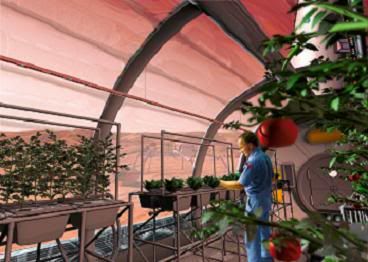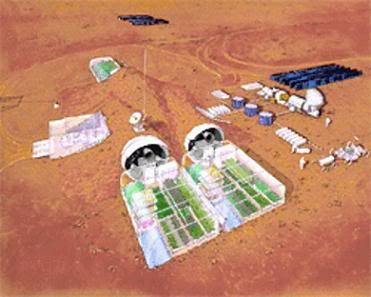Post by glactus on Aug 31, 2011 3:31:05 GMT
In preparation for the Great Martian adventure, the NASA Advanced Food Technology project is currently working to address the issues of food variety, weight, volume, nutrition and trash disposal through research and external academic and commercial collaborations.

A Martian green house
Speaking at the 242nd National Meeting and Exposition of the American Chemical Society (ACS), Maya R. Cooper said that provisioning the astronauts with food stands as one of the greatest challenges in scripting the first manned mission to Mars

Growing food
ACS, the world largest scientific society, opened the meeting at the Colorado Convention Center and downtown hotels. With more than 7,500 reports on new advances in science and some 9,500 scientists and others expected in attendance, it will be one of 2011's largest scientific gatherings.

Mars Scientist
Cooper explained that the challenges of provisioning space vehicles and Martian surface bases begin with tangible factors, such weight and nutrition, and encompass psychological nuances, such as providing a varied, tasty menu that wards off boredom.
The solutions envisioned now include requiring astronauts to grow some of their own food and engage in much more food preparation than their counterparts on the International Space Station.
"We need new approaches. Right now, we are looking at the possibility of implementing a bioregenerative system that would involve growing crops in space and possibly shipping some bulk commodities to a Mars habitat as well. This scenario involves much more food processing and meal preparation than the current food system developed for the space shuttles and the International Space Station."

Credits: These are non copywrite images.
This is part text only. See full text and all scientists involved at Space daily.com
www.marsdaily.com/reports/Filling_the_pantry_for_the_first_voyages_to_the_Red_Planet_999.html

A Martian green house
Speaking at the 242nd National Meeting and Exposition of the American Chemical Society (ACS), Maya R. Cooper said that provisioning the astronauts with food stands as one of the greatest challenges in scripting the first manned mission to Mars

Growing food
ACS, the world largest scientific society, opened the meeting at the Colorado Convention Center and downtown hotels. With more than 7,500 reports on new advances in science and some 9,500 scientists and others expected in attendance, it will be one of 2011's largest scientific gatherings.

Mars Scientist
Cooper explained that the challenges of provisioning space vehicles and Martian surface bases begin with tangible factors, such weight and nutrition, and encompass psychological nuances, such as providing a varied, tasty menu that wards off boredom.
The solutions envisioned now include requiring astronauts to grow some of their own food and engage in much more food preparation than their counterparts on the International Space Station.
"We need new approaches. Right now, we are looking at the possibility of implementing a bioregenerative system that would involve growing crops in space and possibly shipping some bulk commodities to a Mars habitat as well. This scenario involves much more food processing and meal preparation than the current food system developed for the space shuttles and the International Space Station."
Credits: These are non copywrite images.
This is part text only. See full text and all scientists involved at Space daily.com
www.marsdaily.com/reports/Filling_the_pantry_for_the_first_voyages_to_the_Red_Planet_999.html


